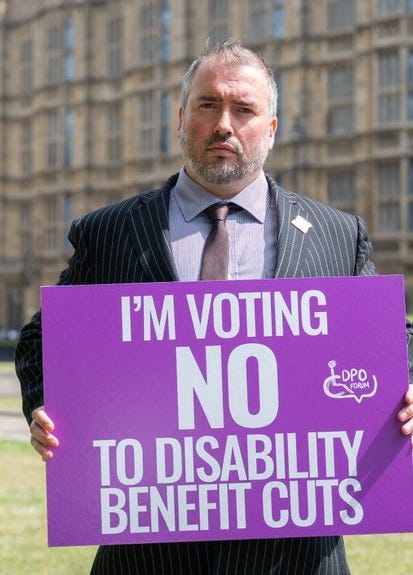Hello and welcome to the 250 new subscribers who joined following my coverage of the Labour conference and my Guardian article about electoral reform. It is great to have you on board.
Due to the fact that, for the last nine months, so many of you have been willing to put your hand in your pockets to support this newsletter, we have a very big announcement coming next week.
As the last few weeks have been very “politicy”, this week we are going to deep dive into a few issues. This week will cover:
The concerning way that religious institutions are taking public money while failing many of Wales most vulnerable.
Some Senedd “banter”
What Jeremy Corbyn’s new party would mean for Wales
The Welsh Labour MPs who opposed the welfare reforms
Why Labour Senedd Members are annoyed with Keir Starmer for his whine-and-dash speech at conference
Before we start, a word from our sponsor who I highly recommend you take a look at get more people noticing your product or organisation:
This newsletter is sponsored by Hello Starling. A proudly Welsh company, Hello Starling plan and buy media, backed by data, which is designed to get maximum attention and measurable results. They specialise in getting eyes on your organisation, product and website. If you are looking to get a return on investment, a change in perception, more visitors, more subscriptions, a bigger audience or a happier audience, I highly recommend you check them out here. In doing so you help support this newsletter.
Why are the Welsh Government giving away public property?
I want to take a bit of time to look at the issues with religious institutions within Welsh education.
I want to stress I am in no way attacking people of any particular faith. I come from a family where many members are passionate in their faith and I have observed the good work their beliefs inspire them to.
However, there are demonstrable issues with how religious organisations are being given favourable treatment within Wales.
For context, Wales is less religious than England. According to the last census, 46.5% of people in Wales said they had no religion compared to 36.7% in England. This means that the “no religion” group in Wales now exceeds those identifying as “Christian” (43.6%) for the first time ever in the census.
The map below shows people of “no religion” in Wales.
This map shows rates of Christianity across England and Wales The darker the colour the more Christians).
As you can see, there is significantly less Christianity in Wales than there is in many parts of England. With that in mind, let's look at some of the issues with education.
The Welsh Government to spend over £100m on buildings and gift them to the Catholic Church
There are plans to spend £100m of public money on two new Catholic schools that would then be handed to the church.
One is in the Vale of Glamorgan where £63 million is being invested into a new Catholic school building. The project will replace the existing St Richard Gwyn Catholic High School in Barry and increase its capacity.
The other is in Flintshire where four existing Catholic schools are planned to be merged into a single “super-school”. This will accommodate kids aged between 3–18. This will cost £55 million, with 85% of the funding provided by the Welsh Government.
In both these cases the church will own the buildings after the development.
A few weeks ago this newsletter discussed how many school buildings around Wales are crumbling to the detriment of both those communities and young people. Budgets are incredibly stretched. While I wouldn’t question the need for new and improved school buildings, I do question why public assets are being gifted to an organisation whose wealth is possibly in the trillions of pounds worldwide…
When I approached the Welsh Gov about this they said that “to secure funding” and application would have to go through the “business case scrutiny process and ministerial approval” and that:
“Funding will be subject to match funding from the governing body, diocese or local authority.”
To be clear, in the above cases the vast, vast majority of the money was coming from the state. I also don’t know why they think it is acceptable that money coming from local authorities is also essential gifted to religious organisations.
What is the justification for building more religious schools anyway?
In the Vale of Glamorgan the councils community impact assessment report stated that the development was needed to “ensure the Council is able to accommodate the future demand for faith based education based on current trends”. But what trend is this?
Between 2011 and 2021 the number of people saying they were of “no religion” increased in the Vale from 33% to 48%.
The issue of selection
What is most galling about this gift of state assets to a religious institution is that both schools will be able to select 100% of their pupils on the basis of religion.
This problem is much bigger in Wales because unlike England, there is no “faith school” cap. The cap in England limits faith schools to 50% of admissions being solely on the basis of faith, the other 50% has to be open to all. Whereas here in Wales the Welsh Gov allows 100% of admissions to be from the faith of the school.
So if you are a kid who literally lives next door to this state built and funded school but happens to be of the “wrong” religion, you can be rejected at the expense of a child miles away whose parents decided to raise them in the “right” faith.
This presents other issues because it is local authorities who have to fund children who have to travel out of their area (usually over 3 miles) to attend a faith school, but they don't fund children's travel to a non-faith school if they want to avoid a faith-based education.
Changes to school travel are currently being consulted on by the Welsh Government but, given the millions cash-stretched councils are spending on this already, I would be amazed if they extended this travel to non-religious students. Just for context, England made this change back in 2016!
This is not healthy for society
In addition, at a time when the far right are trying to divide communities and have us see our neighbours as “other”, is it really conducive to community cohesion for the state to actively fund and promote an education system that divides children at the age of four by the religion of their parents? Barriers are not built by division.
The myth that faith schools have better outcomes…
One of the reasons that support for faith schools is so high is because there is a perception that they have better outcomes. But the problem is that when you dig into the data, this really isn’t the case.
Lots of this evidence comes from England because the Welsh Government stopped gathering this data in 2019.
Here is a breakdown:
At a glance, non-faith schools do underperform against Catholic and Anglican schools in terms of grades.
But the data shows that those faith schools also take significantly fewer children from poor backgrounds than would be proportional to their local communities. Poverty has a huge impact on educational outcomes. So essentially the “good schools” are not taking a fair proportion of the poor kids that live right next to them.
Also a study by the Education Policy Institute found that once you adjust for prior attainment, deprivation and special educational needs, the gap between faith and non-faith schools is “educationally insignificant”.
In addition, faith schools tend to take fewer children with special education needs. This can be as much as 24% less than other schools.
I would love to give you more Wales specific data but the Welsh Government doesn’t gather it. They would seemingly rather give organisations state assets than measure how they are performing…
The loophole that allows faith schools to ignore kids in care

I have very good friends who have adopted children that were previously in the care system. I was delighted to find out that, because their children had been in care, they were able to have first choice for admission into any state funded school.
This is because in Wales, all state-funded schools are required by the School Admissions Code to prioritise the admission of care-experienced children in their admission arrangements. The reason for this is that many children who are or have been in care start from a position of considerable disadvantage, which places a duty on schools and other public institutions to promote their education and development as much as possible. A good thing right?
Well, apart from the fact there is a massive loophole that allows faith schools to prioritise a child that matches their faith over a child who has been in care. The data shows that at primary level in Wales, 50% of Catholic primary schools prioritise faith over care-experienced kids when it comes to selection.
It doesn’t have to be this way. By contrast, only 1% of Church in Wales schools employ the same bias in their selection.
So we have a situation where the state is allowing religious organisations to use public money to prioritise children of their own faith over children with special needs, who have been in care and are poorer. This is not a good use of public money or remotely fair
No one is inspecting what religious teachings these schools are delivering
In Wales, faith schools are inspected by Estyn, but their religious education is not. Instead the Churches are allowed to inspect themselves. There is no oversight. Under the new curriculum, they must offer non-denominational RE if parents request it, but there are no checks in place to make sure this happens.
Again it begs the question if it is right to pay religious institutions to provide an RE curriculum of their choice with no outside scrutiny at a time we need to make society less divided? It has never been more important that young people appreciate and understand the views of others.
You know things are bad when you are behind Northern Ireland…
I promise to move on from this subject but I just want to finish with how recruitment works for faith schools.
Faith schools have the ability to appoint teachers to all positions who share the same faith as the school - this means other teachers are discriminated against in appointments for subjects which have no need for a shared faith.
There is no good reason why a science, maths or history teacher needs to be of a particular religion to deliver the curriculum.
To put this in context, even Northern Ireland fixed this problem last year. Wales and England have not.
The Welsh Gov’s response…
When I approached the Welsh Government about the selection criteria and the lack of a “faith cap” in Wales they said (the bold was added by them):
“As with all oversubscription criteria, those that are faith-based must be objective and transparent. Parents and families must be able to understand easily how the criteria will be satisfied.
“Admission authorities for schools with a designated religious character (faith schools) may give first priority to all looked after children and previously looked after children, whether or not of the faith but must give first priority to looked after children and previously looked after children of their faith above any other children of their faith.”
This is a ridiculous response. “Must be objective and transparent” is meaningless. Selection for many faith schools are perfectly transparent and objective. The issue is that the criteria that they are being transparent and objective about are utterly unfair for the majority of children whose parents are not of that faith.
Parents being “able to understand easily” how to meet the criteria simply means that well off parents are more able to jump through the hoops, which compounds faith schools taking fewer poor kids.
Trying to defend faith schools using the loophole to deprioritise children from care is also a terrible stance for the Welsh Gov to take. Saying “oh don’t worry, they prioritise vulnerable children from the right religion” totally misses the point. You are still allowing a state funded school to put societies most vulnerable down the list because of their faith (or lack of).
On the gifts of state assets Humanists UK’s director of public affairs and policy Richy Thompson said:
“We urge the Welsh Government and local authorities to reconsider such funding arrangements and to make sure public investments in education serve the broader community without advancing specific religious interests.
“The allocation of substantial public resources to faith-based institutions, which have selective admissions and employment policies, undermines the principles of equality and inclusivity.”
Senedd banter…
Hyper aware as I am about this newsletter becoming a bit miserable I thought I would share with you this little nugget from the Senedd.
Conservative MS Gareth Davies was asking the Welsh Labour Minister Ken Skates about the tourism tax (you can see the details of this from a previous newsletter here).
Mr Skates responded: “I actually went over to Conwy which is a fabulous place too. And you’ll be aware that it has the smallest house in the world on the seafront there. And I was told that your party is going to be holding your post-election conference in the porchway, in that particular tourist attraction next year.”
Right, now you have had that dorky pallet cleanser, on with the newsletter.
What Jeremy Corbyn’s new party would mean for Wales
As I write this newsletter it is being announce Zarah Sultana and Jeremy Corbyn are starting a new party. I don’t have much details but I am going to give you my initial take on what this would mean for Wales.
Obviously there are still a lot of details to be revealed, but if this party was to stand in the 2026 Senedd election it would be a gift to Reform. Unlike in England, there is an alternative to Labour on the left which is viewed as having a good chance of getting elected in Plaid Cymru.
I can’t see a new party picking up much more that 7-8% of the vote at the most. However, this vote is highly likely to come from disillusioned Labour voters, many of whom have been switching to Plaid. If the new party were to get around 8% across Wales they would likely win no seats but would split the vote on the left meaning Reform would likely benefit.
I don’t want to say more because we have no real details yet (or even know if the party will run).
Why safe seats kill democracy
I am not going to cover the scenes around the watered-down welfare bill except to say that, given the bill was going to hit Wales harder than anywhere, it’s hard to see its demise as anything but a good thing for Cymru. I will reinforce the point we made last week that Welsh Labour can claim no credit at all for this. They had no impact on the bill being watered down and need to stop claiming it as a personal win.
What I do want to look at are the Welsh Labour MPs who opposed the bill because I think it demonstrates why the idea of “safe seats” is so corrosive to the motivation of MPs to really represent their constituents.
There were three Labour MPs who initially opposed (the four Plaid and one Lib Dem also did).
These were:
Steve Witherden, Montgomeryshire and Glyndŵr
Henry Tufnell, Mid and South Pembrokeshire,
Ruth Jones, Newport West and Islwyn
They were then joined by
Chris Evans, Caerphilly
Andrew Ranger, Wrexham
Now I appreciate that this isn’t the biggest sample size but I think there is a lesson here about how being insecure in a seat makes an MP far more conscious that they have to justify how they vote to their constituents when the next election rolls around.
Steve Witherden for example, who even voted against the bill after the amendments, represents the only constituency in Wales which was considered “safe” for the Tories before the election. He ended up getting in after Craig Williams made THAT infamous bet on the election date. It is therefore vital to Mr Witherden’s future career that he is able to argue to his constituents that he went out to bat for them.
While Steve Witherden has always been unafraid of going against his party's line, Henry Tufnell was a real surprise. But then when you look at the results from last year you see that he has a majority of less than 2,000 and has a seat which had been Tory for many years before he took it.
Andrew Ranger in Wrexham may have a decent majority but he too replaced a Tory in the seat and only increased the Labour vote share by 1%.
So we have three MPs, in seats that may be hard to hold, who are all new to the job.
The other two are a bit different. Chris Evans in Caerphilly has a decent majority of 6,500 though his vote share actually fell 6 percentage points at the last election with big gains for both Reform and Plaid. Ruth Jones has a 9k majority. Both were however forecast to lose their seats to Reform in a recent poll.
Now I am not saying that it was merely self interest that motivated these five to oppose the bill.
Keep reading with a 7-day free trial
Subscribe to The Will Hayward Newsletter to keep reading this post and get 7 days of free access to the full post archives.








